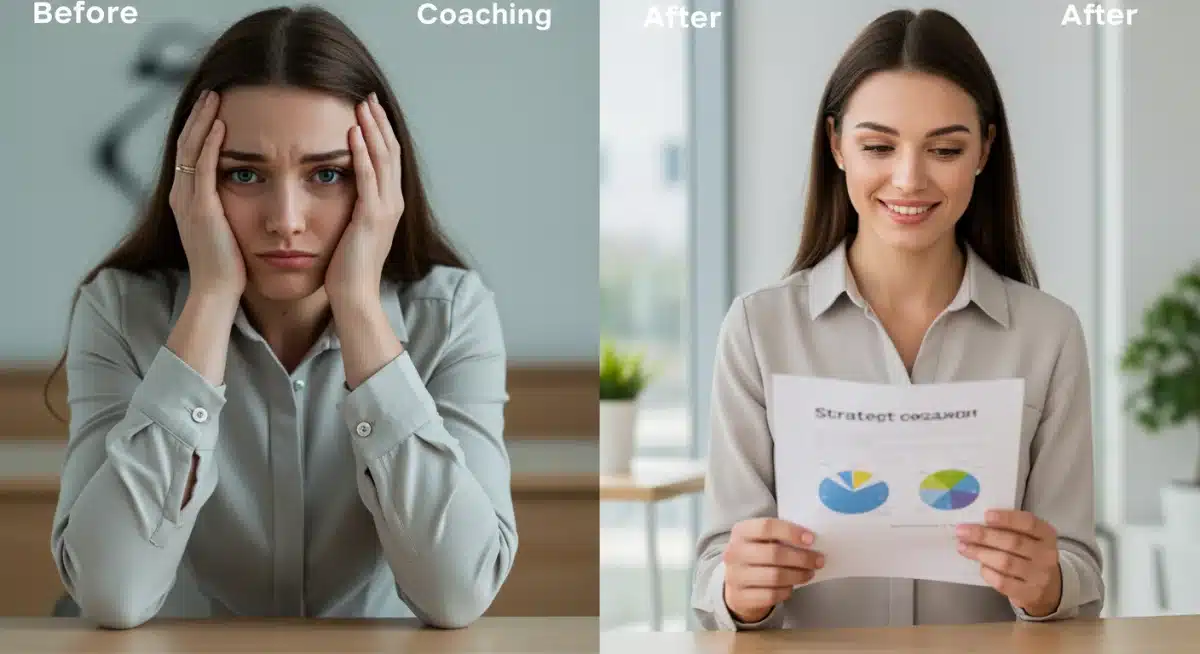Executive Coaching for Women: Best ROI Programs in 2025

Advertisements
Analyzing executive coaching options for women in 2025 is crucial for identifying programs that deliver the best return on investment, focusing on tailored strategies for leadership development and career acceleration in the United States.
Executive Coaching Women ROI is a critical focus for professional women aiming for leadership roles in 2025, with new analyses clarifying which programs promise the most significant returns. This update prioritizes comprehensive comparisons, highlighting key benefits, costs, and strategic advantages that empower women to make informed decisions for their career trajectories.
Understanding the Landscape of Executive Coaching for Women in 2025
The executive coaching industry for women is experiencing dynamic shifts, driven by evolving workplace demands and a heightened focus on diversity and inclusion at the highest levels. As more women ascend to leadership, the need for tailored, high-impact coaching becomes increasingly apparent. In 2025, the market offers a diverse array of programs, each promising unique benefits, but discerning which ones truly deliver a measurable return on investment (ROI) is paramount.
This section delves into the foundational aspects of executive coaching, specifically for women. It examines how coaching addresses gender-specific challenges such as imposter syndrome, navigating male-dominated environments, and balancing professional ambitions with personal responsibilities. Understanding these nuances is essential for any woman considering a coaching investment, as it directly impacts the potential for tangible results and long-term career success.
The Evolving Role of Women in Leadership
- Increased representation in C-suite positions.
- Growing demand for female-centric leadership development.
- Emphasis on inclusive leadership styles.
The landscape is no longer about simply getting women into leadership roles, but equipping them with the tools, strategies, and confidence to thrive there. Effective coaching programs are designed to not only enhance skills but also to foster resilience and strategic thinking, preparing women for the complexities of modern executive functions. The focus is on holistic development that addresses both professional competencies and personal empowerment.
Key Factors Defining ROI in Executive Coaching Programs
Measuring the return on investment for executive coaching can be complex, as its benefits often extend beyond quantifiable metrics into areas like enhanced decision-making, improved team dynamics, and increased organizational influence. However, for women investing in their professional growth in 2025, identifying programs with clear pathways to measurable results is crucial.
This section outlines the primary factors that contribute to a strong ROI in executive coaching. These include the coach’s credentials and experience, the program’s structure and customization, the clarity of goal setting, and the methods used for progress tracking. A program’s ability to demonstrate a clear link between coaching interventions and career advancement or business outcomes significantly boosts its appeal and credibility.
Measuring Tangible and Intangible Returns
- Improved performance metrics (e.g., project completion rates, revenue generation).
- Enhanced leadership skills and team engagement.
- Increased promotion rates and salary negotiations.
Beyond these, intangible benefits like increased self-awareness, confidence, and strategic vision play a vital role in long-term success, though they are harder to quantify directly. The most effective programs integrate both types of outcomes into their framework, ensuring a comprehensive view of the coaching impact. This dual focus allows women to see both immediate career boosts and sustained personal development.
Comparative Analysis of Top Coaching Models for Women
In 2025, various executive coaching models cater specifically to women, each with distinct methodologies and areas of focus. Understanding these differences is essential for selecting a program that aligns with individual career goals and learning preferences. From one-on-one personalized coaching to group mentorship and specialized leadership academies, the options are plentiful.
This comparative analysis explores the leading coaching models, breaking down their typical structures, target outcomes, and suitability for different stages of a woman’s executive journey. We examine the benefits of tailored individual sessions versus the collaborative insights gained from group coaching, and how specialized programs address unique challenges faced by women in specific industries or roles. The goal is to provide a clear overview that aids in informed decision-making.
One-on-One Coaching vs. Group Programs
One-on-one coaching offers highly personalized attention, allowing for deep dives into individual challenges and strengths. This model is ideal for women seeking intensive, confidential guidance on specific career hurdles or leadership transitions. The focus is entirely on the coachee’s agenda, leading to rapid, targeted development.
Conversely, group coaching programs leverage peer learning and collective wisdom. They provide a supportive network where women can share experiences, gain diverse perspectives, and build a strong professional community. While less individualized, group settings often foster a sense of solidarity and shared purpose, which can be incredibly empowering.
Specialized Leadership Academies
Many organizations and independent bodies now offer specialized leadership academies designed exclusively for women. These programs often combine intensive workshops, mentorship, and practical projects to cultivate specific leadership competencies. They can be particularly beneficial for women aiming for C-suite roles or those in industries with unique leadership demands, providing structured development paths and networking opportunities.
The curriculum often includes modules on strategic negotiation, effective communication, power dynamics, and executive presence, all tailored to the female experience. These academies often culminate in certifications or capstone projects that demonstrate advanced leadership capabilities, enhancing a woman’s professional portfolio and marketability.
Identifying Programs with Proven Success and Testimonials
When evaluating executive coaching options, looking for programs with a track record of success and compelling testimonials from female executives is critical. In 2025, transparency and verifiable results are increasingly important for justifying the investment. A program’s reputation, built on the achievements of its participants, speaks volumes about its efficacy.
This section focuses on how to identify and vet coaching programs that have consistently delivered positive outcomes for women. It emphasizes the importance of reviewing case studies, seeking out independent reviews, and directly engaging with past participants to understand their experiences and the tangible impact on their careers. Programs that can clearly articulate their success stories and provide access to references often stand out as top contenders for a strong ROI.
The Power of Peer Endorsement
Word-of-mouth and testimonials from other successful women who have undergone particular coaching programs are invaluable. These personal accounts often provide insights into the real-world application of coaching strategies and the lasting benefits derived. Look for testimonials that detail specific achievements, such as promotions, successful project completions, or significant shifts in leadership style and effectiveness.

Accreditations and Certifications
While not a direct measure of ROI, a coach’s accreditations from reputable bodies like the International Coaching Federation (ICF) or other recognized professional organizations often indicate a commitment to ethical practices and high standards of training. These certifications provide a baseline assurance of quality and professionalism, contributing indirectly to the likelihood of a positive coaching experience and outcome. Programs associated with well-regarded institutions or universities also tend to carry greater weight and offer robust curricula. This is a crucial aspect of ensuring the quality of the coaching one receives.
Cost-Benefit Analysis: Investing in Your Executive Future
The financial investment in executive coaching can range significantly, from a few thousand dollars for short-term engagements to tens of thousands for comprehensive, year-long programs. For women aiming for executive leadership in 2025, a thorough cost-benefit analysis is essential to ensure that the chosen program aligns with both financial capacity and desired career outcomes. This involves more than just looking at the price tag; it requires evaluating the potential returns against the expenditure.
This section provides a framework for conducting a detailed cost-benefit analysis. It encourages prospective coachees to consider not only the direct costs of the program but also the opportunity costs and the potential for increased earning potential, accelerated career progression, and enhanced job satisfaction. Understanding these components helps in making a strategic investment decision that maximizes the Executive Coaching Women ROI.
Calculating the Financial Return
Direct financial returns from executive coaching can include salary increases, bonuses, and equity gains resulting from promotions or successful business ventures. Quantifying these can be challenging but is not impossible. Many studies and anecdotal evidence suggest that executive coaching can lead to significant boosts in earning potential, often far outweighing the initial investment within a few years. For instance, a small percentage increase in salary due to enhanced leadership skills can quickly cover the cost of a high-quality program.
Furthermore, the ability to negotiate more effectively, secure higher-stakes projects, or even launch successful entrepreneurial endeavors can be direct results of targeted coaching. These outcomes represent clear, measurable financial benefits that contribute directly to the ROI calculation. It is important for women to clearly define what financial success means to them before embarking on a coaching journey.

Long-Term Career Impact and Personal Growth
Beyond immediate financial gains, the long-term career impact of executive coaching is substantial. This includes developing a robust professional network, cultivating a strong personal brand, and acquiring advanced strategic thinking capabilities. These are assets that continue to yield dividends throughout a woman’s career, opening doors to new opportunities and leadership roles that might otherwise remain out of reach.
Personal growth, such as increased confidence, improved work-life balance, and enhanced resilience, also contributes significantly to overall career satisfaction and effectiveness. While these benefits are harder to assign a monetary value, they are invaluable for sustaining a successful and fulfilling executive career. The holistic development fostered by effective coaching ensures that women are not just climbing the corporate ladder but doing so with purpose and well-being.
Emerging Trends in Executive Coaching for Women in 2025
The executive coaching landscape is continuously evolving, with new trends emerging that promise to further enhance the effectiveness and accessibility of programs for women in 2025. These trends are shaped by technological advancements, changing workplace dynamics, and a deeper understanding of gender-specific leadership development needs. Staying abreast of these developments is key to selecting a forward-thinking program that offers cutting-edge advantages.
This section explores the most significant emerging trends, including the integration of AI and data analytics in coaching, the rise of virtual and hybrid coaching models, and an increased focus on holistic well-being and resilience. These innovations are transforming how executive coaching is delivered and experienced, offering greater flexibility, personalization, and measurable outcomes for women seeking to maximize the Executive Coaching Women ROI.
AI-Powered Coaching and Data Analytics
The integration of artificial intelligence (AI) and data analytics is revolutionizing executive coaching. AI-powered platforms can provide personalized feedback, track progress, and even identify blind spots more efficiently than traditional methods. This technology can analyze communication patterns, leadership styles, and performance data to offer highly customized insights, making coaching more precise and impactful. For women, this means access to objective, data-driven feedback that can accelerate their development and help them navigate complex corporate environments with greater clarity.
Data analytics also allows for a more rigorous measurement of coaching effectiveness, providing tangible evidence of ROI. Coaches can use these tools to demonstrate the direct impact of their interventions on a coachee’s performance and career progression, offering a compelling case for investment. This trend is particularly beneficial for women who often need to demonstrate clear, measurable results to justify their professional development expenditures.
Virtual and Hybrid Coaching Models
The proliferation of virtual and hybrid coaching models has made executive development more accessible and flexible than ever before. For busy female executives, who often juggle demanding careers with personal responsibilities, the ability to receive high-quality coaching remotely is a game-changer. Virtual platforms leverage video conferencing, online collaboration tools, and digital resources to create engaging and effective coaching experiences.
Hybrid models combine the best of both worlds, offering a mix of in-person sessions and virtual interactions. This flexibility allows for deeper personal connection when needed, while still providing the convenience of remote access. These models ensure that geographical location is no longer a barrier to accessing top-tier executive coaching, democratizing opportunities for women across various regions and industries.
Key Aspect |
ROI Driver |
|---|---|
Tailored Programs |
Addresses specific challenges for women leaders, leading to targeted growth. |
Coach Credentials |
Ensures high-quality guidance and proven methodologies for effective development. |
Measurable Outcomes |
Focus on quantifiable results like promotions, salary increases, and skill enhancement. |
Networking Opportunities |
Expands professional connections, leading to mentorship and new career pathways. |
Frequently Asked Questions About Executive Coaching for Women
Executive coaching for women often addresses challenges like imposter syndrome, navigating gender biases, developing executive presence, strategic negotiation, and balancing professional ambition with personal life. It provides tailored strategies to overcome these hurdles and foster confidence.
Measuring ROI involves tracking tangible outcomes such as promotions, salary increases, performance improvements, and successful project leadership. Intangible benefits like increased confidence, improved communication, and enhanced strategic thinking also contribute significantly to overall career success.
Yes, virtual coaching can be highly effective, offering flexibility and accessibility crucial for many women. Modern platforms ensure engaging interactions, and many studies show comparable outcomes to in-person sessions, especially when combined with a well-structured program and a skilled coach.
Look for certifications from reputable organizations like the International Coaching Federation (ICF), extensive experience coaching women in leadership, and strong testimonials. A coach’s industry background and alignment with your career goals are also important considerations.
Results vary, but many women report noticing significant shifts in confidence and strategic approach within 3-6 months. More profound career advancements and measurable ROI typically become evident within 6-12 months of consistent engagement with a well-aligned coaching program.
What this means
The analysis of executive coaching options for women in 2025 underscores a clear trend: strategic investment in tailored programs yields significant returns. Women seeking to accelerate their careers should prioritize programs that offer a blend of personalized attention, proven methodologies, and a strong network. The evolving landscape, including AI integration and flexible virtual models, means more opportunities than ever to find a program that truly aligns with individual goals and maximizes the Executive Coaching Women ROI. Monitoring program outcomes and testimonials will remain crucial for making informed decisions in an increasingly competitive executive environment.





